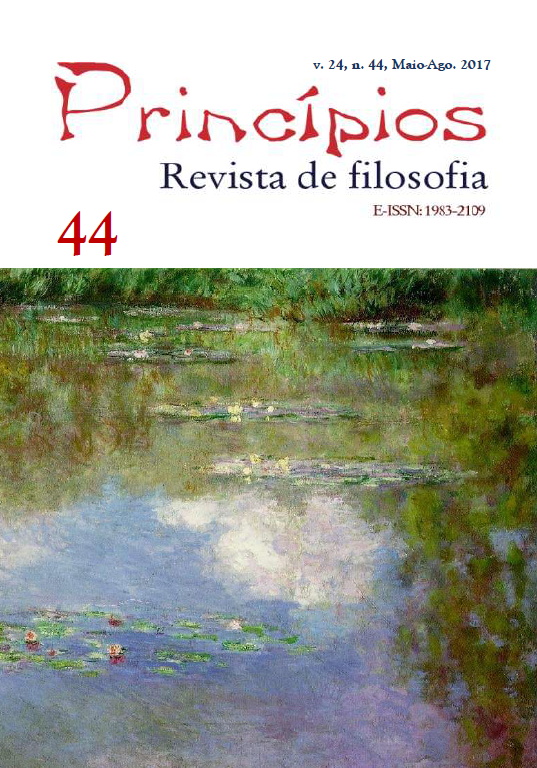Montesquieu: republicanismo e corrupção política [Montesquieu: republicanism and political corruption]
DOI:
https://doi.org/10.21680/1983-2109.2017v24n44ID11568Keywords:
Republicanismo, Virtude, Igualdade, Liberdade, Corrupção política [Republicanism, Virtue, Equality, Liberty, Political corruption]Abstract
Embora Montesquieu seja conhecido, acima de tudo, por sua célebre teoria da separação dos poderes e tenha seu pensamento recorrentemente vinculado à perspectiva do liberalismo, sua reflexão política não pode se restringir a essas duas linhas interpretativas. Principalmente porque entendemos que a reflexão apresentada pelo pensador de Bordeaux também possui uma interessante ligação com a tradição republicana e contribuiu expressivamente para a retomada dessa tradição no Século das Luzes. Partindo dessa hipótese, o presente artigo tem como objetivo principal demonstrar e valorizar a contribuição de Montesquieu para com a formação do republicanismo. Para tanto, nos concentraremos: em primeiro lugar, na análise que ele realiza acerca do legado romano, isto é, as especificidades de Roma em seu período republicano e a relevância da virtude política para esse regime; em segundo lugar, na avaliação e promoção de uma discussão sobre os dois fundamentos imprescindíveis da República: a igualdade e a liberdade; por fim, na investigação das razões pelas quais a corrupção política e o luxo podem conduzir à República a falência.
[While Montesquieu is known, above all, for his celebrated theory of separation of powers and his thought is recurrently linked to the perspective of liberalism, his political thought cannot be restricted to those two interpretative lines. Mainly because we understand that the ideas proposed by the philosopher of Bordeaux also has an interesting connection with the Republican tradition and has contributed significantly to the resumption of this tradition in the Age of Enlightenment. From this hypothesis, the main objective of this article is to demonstrate and value the contribution of Montesquieu to the formation of republicanism. For this goal, we shall focus: firstly, on the analysis he per-forms of the Roman legacy, that is, the specifics of Rome in its Republican Period and the relevance of political virtue to that regime; secondly, on the review and promotion of a discussion of the two essential foundations of the republic: equality and liberty; finally, on an investigation of the reasons why political corruption and luxury can lead the republic to failure.]
Downloads
References
BARROS, Alberto Ribeiro G. de. Republicanismo inglês: uma teoria da liberdade. São Paulo: Discurso, 2015.
BIGNOTTO, Newton. As aventuras da virtude: as ideias republicanas na França do século XVIII. São Paulo: Companhia das Letras, 2010.
CÍCERO, Marco Túlio. La république. Paris: Gallimard, 1994.
DIDEU, Joseph. As ideias políticas e morais de Montesquieu. In: QUIRINO, C. G.; SOUZA, Maria T. S. R. de. (Org.). O pensamento político clássico. São Paulo: T. A. Queiroz, 1980. p. 249-289.
DORIGNY, M. Montesquieu dans la révolution française. Paris; Genebra: EDHIS-Slakine, 1990.
DUBOUCHET, Paul. De Montesquieu le moderne à Rousseau l’ancien: la démocratie et la république em question. Paris: L’Harmattan, 2005.
FILGUEIRAS, F. Corrupção, democracia e legitimidade. Belo Horizonte: UFMG, 2008.
HIRSCHMA, Albert. As paixões e os interesses. Rio de Janeiro: Paz e Terra, 1979.
LARRÈRE, Catherine. Les typologies des gouvernements chez Montesquieu. Études sur le XVIIIe siècle ? Université de Clermont II, Faculté des Lettres et Sciences Humaines. n. 3, 1979, p. 157-172.
MANDEVILE, B. La fable des abeilles. 3. ed. Paris: J. Vrin, 1991. 2 v.
MAQUIAVEL, N. Discurso sobre a primeira década de Tito Lívio. São Paulo: M. Fontes, 2007.
MONTESQUIEU, Charles-Louis de Secondat, Barão de. Considerações sobre as causas da grandeza dos romanos e da sua decadência. São Paulo: Saraiva, 2005.
MONTESQUIEU, Charles-Louis de Secondat, Barão de. O Espírito das leis. São Paulo: Nova Cultural, 1997. 2 v. (Coleção Os Pensadores).
MOSCATELI, Renato. Rousseau frente ao legado de Montesquieu: história e teoria política no Século das Luzes. Porto Alegre: PUCRS, 2010.
NELSON, Eric. The Greek tradition in republican thought. New York: Cambridge University Press, 2004.
PANGLE, Thomas L. Montesquieu’s philosophy of liberalism: a commentary on The Spirit of Laws. Chicago: The University of Chicago Press, 1998.
POCOCK, J.G.A. The machiavellian moment. Princeton: Princeton University Press, 1975.
RAHE, Paul A. Situating Machiavelli. In: SKINNER, Q.; DASTON, L.; ROSS, D.; TULLY, J. (Ed.). Renaissance civic humanism: reappraisals and reflections. New York: Cambridge University Press, 2000.
ROUSSEAU, J.-J. Do contrato social. São Paulo: Nova Cultural, 1997. Vol. I. p. 27-256. (Coleção Os Pensadores).
SANTOS, Antônio Carlos dos. A política negada: poder e corrupção em Montesquieu. São Cristóvão: UFS; Aracaju: Fundação Oviêdo Teixeira, 2002.
SHKLAR, Judith N. Political thought and political thinkers. London: The University of Chicago and London, 1998.
SOREL, Albert. Montesquieu. Paris: Hachette et Cie., 1887.
SPECTOR, Céline. Montesquieu: critique of Republicanism? In: WEINSTOCK, D.; NADEAU, C. (Ed.). Republicanism: history, theory and practice. Montreal; London: University of Montreal and London, 2004.
SKINNER, Quentin. As fundações do pensamento político moderno. São Paulo: Companhia das Letras, 1996.
STAROBINSKI, Jean. Montesquieu. São Paulo: Companhia das Letras, 1990.
STRAUSS, Leo. Qu’est-ce que la philosophie politique? Paris: Presses Universitaires de France, 1992.
VERNIÈRE, Paul. Montesquieu et l’espirit des lois ou la raison impure. Paris: C.D.U.; Société d’Edition d’Enseignement Supérieur, 1977.
Downloads
Published
How to Cite
Issue
Section
License
Authors retain copyright and grant the journal right of first publication with the work simultaneously licensed under a Creative Commons Attribution License that allows others to share the work with an acknowledgement of the work's authorship and initial publication in this journal.


 Português (Brasil)
Português (Brasil) English
English Español (España)
Español (España) Français (Canada)
Français (Canada)


